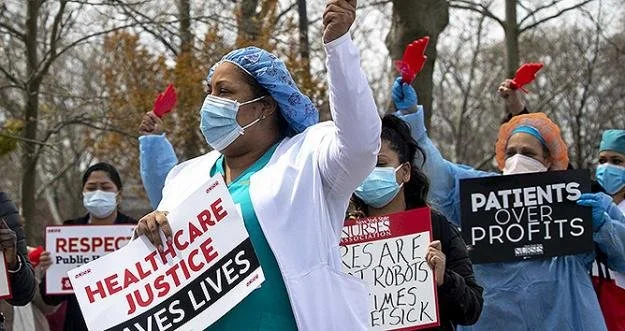Medicine has a long history of reinforcing colonial stereotypes.
Medical students at their induction ceremony at the University of Minnesota. Anthony Souffle. CC BY-NC-ND 2.0
Have you heard that women are 73% more likely to experience serious injuries in a car crash than men? If you are curious as to why, it’s because when designing airbags and other safety features, auto manufacturers use crash-test dummies based on measurements of the average male. These so-called safety precautions are engineered to protect only half of the world’s population. The scariest part, however, is that car manufacturing is not the only industry in which such blatant exclusion and discrimination occur. The practice of medicine, whose sole purpose is to treat and cure people, has recently come under fire for having a foundation rife with antiquated and colonial ideas, upholding social hierarchies that alienate not just women, but people of non-European heritage. The term “decolonizing” here refers to efforts to eliminate these racist, sexist and homophobic ideals that existed during the initial development of the Western Medicine, in favor of methods that recognize and successfully treat the whole, diverse range of patients. This need for a decolonization of healthcare became especially apparent during the COVID-19 pandemic, as African Americans and Hispanic people were twice as likely to have severe cases of the disease as white Americans. Unfortunately, there is no equivalent of the average male crash-test dummy in this case. Western medicine as it is known and applied in many countries around the world has existed for hundreds of years, continuously cementing its elitist and exclusionary ideals.
Protestors in Portland, Oregon during the COVID-19 pandemic in 2020. Spencer Platt. CC BY-SA 2.0
As with most disciplines, medicine is practiced the way it is taught. Exclusionary principles date all the way back to the very origins of the field: even Aristotle described the female body as a mutilated version of the male one. These and other, similar beliefs have trickled down through the years, resulting in the white, heterosexual, able-bodied man being considered the “average” patient, while everyone else is forced to fit the cookie cutter treatments and medical services designed for a fraction of the population. This results in huge gaps in specific medical knowledge about women, people of color and people with disabilities that are often either ignored by the medical community or, more dangerously, are filled by blaming other, unrelated causes.
A prime example of this appears in the controversial condition termed “female hysteria” which, for hundreds of years, has been used by doctors (especially male ones) to label any women’s symptoms or behaviors they did not recognize. Far from being a historical phenomenon, psychology is still used today to brush aside the symptoms of female patients. Dr. Kate Young, a public health researcher from Monash University in Australia, is one of many medical professionals who has published research on how female patients suffering from endometriosis are often referred to as “reproductive bodies with hysterical tendencies,” furthering the harmful idea that women are oversensitive to pain and therefore are more inclined to exaggerate their discomfort.
Improving access to health education is crucial to help female patients deal with medical gaslighting. American Association of Nurse Practitioners. CC BY-SA 2.0
Of course, women are just one of many groups who stand at a systemic disadvantage when receiving medical care and advice, and the effects of racism on the health of people of color and minority populations have been studied extensively for years. In 1992, Professor Arline Geronimus of the University of Michigan proposed a concept called “weathering,” which describes the pattern of early health deterioration among African Americans as the consequences of constant and repeated experiences with socio-political marginalization and discrimination. Almost three decades later, doctors are finally starting to make the connection between this more or less forgotten idea and the disproportionately high incidences for African Americans of high blood pressure, strokes and even colon cancer, along with a host of other conditions.
While contemporary racism, both structural and otherwise, is definitely to blame, we cannot ignore medicine’s long history of excluding Black and Brown bodies in science and research, not to mention medical textbooks, illustrations and even case studies. Historically, the main use of people of color for medical study was as test subjects in unethical experiments, with no intention of using the results to better the medical conditions of these minorities. The Tuskegee Experiments are often the first such example that comes to mind: a study in which American researchers deliberately infected African American men with syphilis under false pretenses, and proceeded to withhold care in order to track the natural progression of the disease. However, other similar “studies” have occurred time and time again, with The Aversion Project singling out LGBTQ+ members of the South African military between 1971 and 1989, or the US government-run Guatemalan syphilis experiments of 1947 which duplicated the Tuskegee study on Guatemalan immigrants to the US. Like female hysteria, the perception that certain people are less deserving of treatment and are therefore more expendable has leached into the modern medical landscape. Fixing such deep-rooted issues will not only require a huge increase in diversity within the medical profession, but also a serious push towards increasing our understanding of how medicine and disease is experienced by a wide range of people.
Nurses in New York advocating for healthcare justice. New York State Nurses Association. CC BY-NC 2.0
Ridding healthcare systems of their colonial foundations will not happen overnight, but there are many individuals and organizations who are working to foster change. Here are a few that you can learn about and support in their efforts to increase diversity and inclusivity in the medical community:
Dr. Annabel Sowemimo: In addition to being a noted doctor and academic, Dr Sowemimo is a prolific activist and writer, especially in regards to reproductive health. She founded the Reproductive Justice Initiative which focuses on reducing health inequalities and also published her first book earlier this year about racism in medicine titled “Divided: Racism, Healthcare, and Why We Need to Decolonize Healthcare.”
Mind The Gap: Founded in late 2019, this project culminated in medical student Malone Mukwende publishing a handbook with staff at St George’s University of London that highlights how a variety of medical conditions present on patients with darker complexions.
Dr. Nadine Caron: As the first female general surgeon of First Nations descent in Canada, Dr. Caron has long been an outspoken advocate for Indigenous people’s rights in both medical practice and research. In 2014, she co-founded the Center for Excellence in Indigenous Health at the University of British Columbia, her alma mater, which focuses on supporting research on Indigenous health.
Advancing Health Equity: Founded in 2019 by Dr Uché Blackstock, an internationally recognized doctor, advocate and speaker, this organization partners with medical institutions and gives professional training on how to provide racially equitable healthcare and medical services.
Tanaya Vohra
Tanaya is an undergraduate student pursuing a major in Public Health at the University of Chicago. She's lived in Asia, Europe and North America and wants to share her love of travel and exploring new cultures through her writing.





